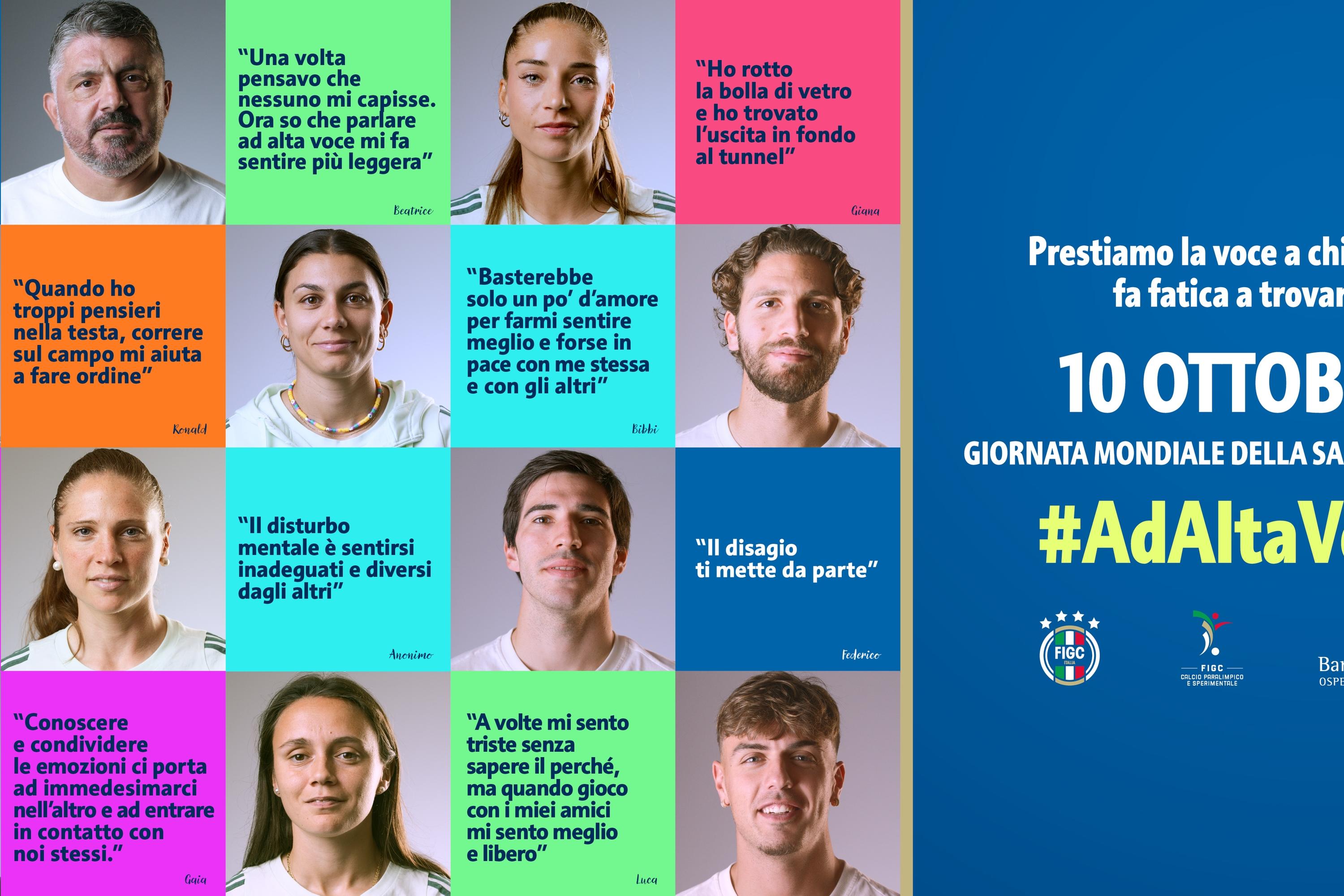PHOTO
Today is World Mental Health Day, set up in 1992 and promoted by the World Health Organisation. To mark the day, the FIGC is launching its ‘Ad Alta Voce’ campaign (developed and produced by the communication agency Enne Factory). It aims to bring awareness to a socially important topic. According to the WHO, one in eight people will experience a mental health problem in their life, not only affecting their physical health, but also their overall wellbeing and quality of relationships.
Depression, social withdrawal, school avoidance, self-harm, anxiety, eating disorders, suicidal ideation. Globally, around one in seven 10–19-year-olds suffer from a diagnosed mental heath issue. Across Europe, over 11 million children suffer with a mental health problem, and 2 million in Italy.
At the Bambino Gesù Pediatric Hospital, neuropsychiatric consultations in the emergency department have risen from 155 in 2011 to 1,844 in 2024. This represents a 1,000% increase: from an average of one consultation every two days to around five per day. Visits for self-harm have increased from 12 in 2011 to 709 in 2024.
The campaign, in collaboration with the Paralympic and Experimental Football Division and the Bambino Gesù Pediatric Hospital, involves 10 members of the men’s and women’s senior national teams (five from each team). They will represent the thoughts and reflections on mental health gathered from athletes in the DCPS (which has around 3,000 members) and from patients at the hospital in Rome.
From the women’s senior national team, participants included head coach Andrea Soncin and players Agnese Bonfantini, Laura Giuliani, Eleonora Goldoni, and Annamaria Serturini. From the men’s, Head Coach Gennaro Gattuso and players Manuel Locatelli, Daniel Maldini, Riccardo Orsolini, and Sandro Tonali were featured.
The statements made by the Azzurri are based on real-life experiences and reflect perspectives of those dealing with psychological distress or a vulnerability. Giving visibility to those who struggle to be heard can help break down the many taboos that still surround mental health.
“The FIGC renews its commitment to social sustainability,” said President Gabriele Gravina, “with a particular focus on mental health, thanks in part to the daily work of the Paralympic and Experimental Football Division and, of course, the specialised efforts of the Bambino Gesù Hospital. With the involvement of the Azzurre and Azzurri, ‘Ad Alta Voce’ aims to offer support to those suffering from these challenges, while also representing a strong and concrete assumption of responsibility. Talking about these issues, rather than staying silent, is the only way, through programs with sector specialists, to help alleviate distress and promote full inclusion, both in sport and in society.”
“We are deeply grateful to the FIGC for launching the ‘Ad Alta Voce’ campaign together with us,” said Tiziano Onesti, President of the Bambino Gesù Hospital. “Addressing mental health with transparency and dignity is a duty to the younger generations. The data show that the emergency is growing. In 13 years, psychiatric consultations in our emergency department have increased dramatically. Today, we can no longer remain silent. A strong network of families, schools, sports, institutions is needed to ensure listening, early diagnosis, and care for every child and adolescent in difficulty.”
“Society, just like a sports team,” Onesti added, “must adopt a team-based system in which everyone acts with a high sense of responsibility, with particular emphasis on preventing and reducing those factors, sometimes introduced for economic reasons, that can significantly contribute to the onset of these conditions. To parents and educators, we send a clear message: you are not alone. Bambino Gesù stands by your side to welcome, guide, and support, ensuring that no young person is left behind and that everyone can look to the future with hope.”
‘Ad Alta Voce’ aligns with the FIGC’s Sustainability Strategy and fits seamlessly into UEFA’s broader social sustainability plan, demonstrating football’s commitment as a tool for inclusion, listening, and cultural change.
Also focusing on mental health, on Saturday, October 11, an even beyond just sports will take place at Viola Park in Bagno a Ripoli (Florence). Organised by the FIGC’s DCPS in collaboration with ACF Fiorentina, the event will feature, among many initiatives, the panel “Head Held High – Football as a Space for Mental Health and Personal Growth,” with numerous guests ready to share their experiences on the topic.
